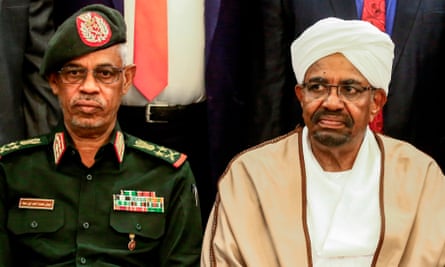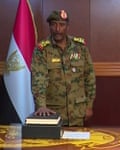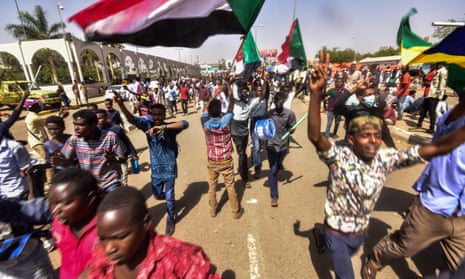The protest movement in Sudan has won a series of fresh victories, forcing new concessions from the country’s military rulers. Hopes are now rising that the country may escape further violence following the fall of President Omar al-Bashir last week.
In the past 48 hours there has been a stand-off between the security forces, who took power after Bashir’s arrest on Thursday, and organisers of the unrest that undermined the authoritarian former president’s grip on power.
On Saturday Salah Gosh, the head of the hated National Intelligence and Security Service (Niss), resigned, while General Abdel-Fattah al-Burhan took charge of the military-led council which currently rules the country. The appointment of the former defence minister, Ahmed Awad Ibn Auf, to the post last week had prompted outrage among pro-democracy demonstrators and activists and Auf was forced to resign on Friday.
In a broadcast to the nation, Burhan praised the “peaceful revolution” and the sacrifices made by Sudanese people, especially women and the young. The 60-year-old soldier lifted a curfew imposed on Thursday, ordered the release of hundreds of political detainees and promised inclusive dialogue with all involved with the aim of forming a civilian government acceptable to everyone.
Observers described the concessions by the army as a positive sign, but the twin resignations and Burhan’s speech may not be enough to satisfy pro-democracy campaigners, who said on Saturday that they opposed any attempt to “reproduce the Bashir regime”, and any decisions by any new authority that did not meet the aspirations of the Sudanese people for “freedom, democracy and peace”.
The Sudanese Professionals Association (SPA), which has organised much of the protest, said it wanted “the transfer of power to a civilian transitional government in which the army participates but [does] not rule and lead”. There was jubilation, however, at the resignation of Gosh, who led a sweeping crackdown against protesters over recent months. Scores have died and hundreds have been wounded by Niss and pro-Bashir paramilitaries. Thousands were detained, many of whom were tortured.
Protests erupted on 19 December in Sudan’s eastern city of Atbara after a government decision to triple the price of bread. This quickly evolved into nationwide demonstrations against Bashir’s 30-year rule.
Burhan is a “veteran soldier” who is not known to be implicated in war crimes or wanted by international courts. He was also one of the generals who went to meet protesters at the encampment near the military headquarters and listened to their views.
The SPA has named a team of negotiators, though it is unclear at present if there will be formal talks between the transitional council and the protest movement, or what form they might take. The team includes two doctors, one lawyer and one journalist. At least three of the team are detainees who have only recently been released after months in prison.
The team’s composition underlines the mobilisation of professionals in the protest movement, a significant contrast with earlier unrest, which largely involved students and young activists concentrated in the wealthier districts of the capital Khartoum.
“These kinds of anti-government demonstrations are not new, but this time a much wider swath of society is involved, including professional classes who for decades were either driven overseas or co-opted [by the regime],” said Zach Vertin, an analyst at the Brookings Institution thinktank and author of a new book on Sudan and South Sudan.

Jehanne Henry, an expert on Sudan with Human Rights Watch, said the current round of protests had been boosted by “a greater mobilisation across the board”.
At the main protest site in Khartoum, Mohamed Abdall, a banker, said “the sit-in should continue until all the leaders of the regime and Bashir face trial for the crimes committed since 1989”.
Hanna Mohammed, a doctor who was arrested and sentenced to six months for protesting earlier this year, said she did not trust the army and the demonstrators would “continue sitting here till all our demands have been achieved”.
The prominent role of women has also been noted by some observers, though many in Sudan stress that women have long been at the forefront of political and social struggles.
However, the geographic spread of the protests has impressed many, as well as the ability of the movement to attract almost all of Sudan’s major ethnic and religious communities.
Bashir’s long rule has left Sudan’s economy in a dire state, with shortages of cash, soaring inflation and very high levels of unemployment. Analysts say only those close to the regime have escaped the consequences of the economic collapse of the country, which was exacerbated by the secession of oil-rich South Sudan in 2011 as well as systematic mismanagement and graft.

After his arrest, the military denounced Bashir, 75, and his government for corruption, maladministration and “lack of justice”. However, the army said that the former ruler would not be extradited to the International Criminal Court, based in The Hague, Netherlands as doing so would be “an ugly mark on Sudan”. Instead the Sudanese courts would hold Bashir accountable, a spokesperson said though he but did not specify what charges he could face.
An association of Sudanese doctors said 26 people had died and more than 150 had been injured – 15 critically – since the sit-in began. Five of the dead were soldiers who were killed protecting the demonstrators during attacks by pro-Bashir militia. Police officials said at least 16 people had been killed and 20 injured by stray bullets at protests and sit-ins on Thursday and Friday.
Burhan’s appointment was cautiously welcomed by some officials of Sudan’s weakened opposition parties. “He is not good, but there is no one who is better than him,” one told the Observer.
Burhan led troops in Sudan’s brutal civil war before the southern region gained independence in 2011. Sudanese media and analysts say Burhan coordinated sending Sudanese troops to Yemen in 2015 as part of a Saudi-led coalition against Iran-backed Houthi rebels. The deployment was part of a major foreign policy shift in which Khartoum broke its decades-old ties with Iran and joined the Saudi-led coalition.
Willow Berridge, author of Civil Uprisings in Modern Sudan and lecturer in history at Newcastle University, said that as part of the Yemen portfolio Burhan worked closely with Sudan’s paramilitary Rapid Support Forces, a brutal militia set up by Bashir which has been blamed for much of the worst abuses under his regime in recent years.
It is with the support of this group that “he now appears to have come to power”, said Berridge.
